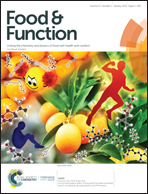Modification of wheat bran particle size and tissue composition affects colonisation and metabolism by human faecal microbiota†
Abstract
Dietary modulation can alter the gut microbiota composition and activity, in turn affecting health. Particularly, dietary fibre rich foods, such as wheat bran, are an important nutrient source for the gut microbiota. Several processing methods have been developed to modify the functional, textural and breadmaking properties of wheat bran, which can affect the gut microbiota. We therefore studied the effect of enzyme treatment, particle size reduction and wheat kernel pearling on the faecal microbiota of ten healthy individuals. The most commonly studied health marker, associated to the gut microbiota activity is Short Chain Fatty Acid (SCFA) production. This study shows that modifying wheat bran physicochemical properties allows control over the extent and the rate of SCFA production by the faecal microbiota. Wheat bran pericarp fractions, depleted in starch and enriched in cellulose and highly branched arabinoxylans, were poorly fermentable compared to unmodified wheat bran, thus resulting in a reduced SCFA production with up to 20 mM. The nature of the SCFA, however, largely depends on the donor and can be linked to the individual's gut microbiota composition. The latter changed in an individually dependent manner in response to wheat bran modification. Some product dependent significant differences could still be identified across the ten donors. This product effect is more pronounced in the microbial community attached to the wheat bran residue as compared to the luminal microbial community. Generally, we find lower levels of Firmicutes, Bacteroidetes and Bifidobacterium and a higher abundance of Proteobacteria in the pericarp enriched wheat bran fractions, compared to unmodified wheat bran.



 Please wait while we load your content...
Please wait while we load your content...